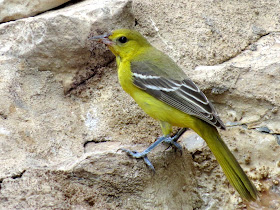We didn't get to Junction in time to do any birding on Friday but Saturday morning I was up and out at dawn to drive the 7 miles to the state park.
On my way into the park I passed a herd of maybe 30 deer, a couple of jackrabbits and a coyote. Arriving at Lora's Blind, I was disappointed to find that there was no water running and no birds. So I moved on to the Agarita Blind, beside the park HQ building. Although it was still too dark for photos, I got good looks at a White-eyed Vireo and a female Summer Tanager. As the light improved a little, I noticed a fawn was moving around at the back of the blind.
Several Black-crested Titmice were active, as was a Chipping Sparrow.
At this point I returned to the motel (the excellent Legends Inn) to pick up Dee. On our way back to the park she checked out every Turkey Vulture overhead and, sure enough, one turned out to be a Zone-tailed Hawk.
Lora's Blind was still quiet and we stayed there only long enough to admire a Western Scrub-Jay.
We then spent most of our time in the park at our favorite blind - the nameless one that is at the start of the Buck Lake trail. We always seem to see more interesting birds here than at the other blinds.
One hanging feeder was attracting lots of American and Lesser Goldfinches.
The male Lesser Goldfinches are very striking little birds in their black and bright yellow plumage.
Inevitably given the number of birds at the feeder, there were frequent squabbles.
A hummer feeder was attracting lots of male and female Black-chinned Hummingbirds as well as a male Ruby-throated Hummingbird. One of the male Blacked-Chinned birds tried valiantly but largely unsuccessfully to keep other hummers away from the feeder.
A couple of White-winged Doves appeared but we were pleased when they left, to be replaced by a Common Ground Dove.
Next up was a female Orchard Oriole.
She didn't seem to mind bathing in the company of Lesser Goldfinches.
A male Summer Tanager arrived but immediately left. Luckily, the Yellow-breasted Chat that followed decided to stay to bathe.
Chats are secretive birds and you normally don't get long looks at them. However, at South Llano River they are not at all shy when they reach the water features.
The park is also a good place for sparrows and it wasn't long before we spotted a Field Sparrow.
It was followed by representatives of the most striking of all sparrow species, Black-throated Sparrow. Several adults were often in view at one time.
Later a juvenile popped in
The final sparrow to appear was a stunning Lark Sparrow.
Like the Orchard Oriole, it seemed not to mind having to share the water feature with Lesser Goldfinches.
Of course, there were more common birds at the blind also. House Finches were constant visitors, as were Northern Cardinals. Most of the latter were adult males but there were a few youngsters.
One female had a quick splash around before standing on the rocks to dry off.
Just as we were ready to leave, a Least Flycatcher came in for a brief visit.
On our way out of the park, we stopped to look for a male Vermilion Flycatcher that had been reported near the dumping station. Although there was no sign of the Vermilion, I did get quick views of an Ash-throated Flycatcher and a Ladder-backed Woodpecker. We also saw three deer rush across the road.
.




























So great! I've followed your blog for a bit and surprisingly ended up camping at South Llano this past weekend too! A friend and I spent some time at the Buck Lake blind and got to see some of those very same goldfinches and hummingbirds. Thanks for sharing--love reading along and seeing your shots!
ReplyDeleteSmall world! I hope you enjoyed your time there as much as we did ours.
ReplyDeleteDefinitely looks like it was worth the long drive Jeff! The Orchard Oriole is a beautiful little bird.
ReplyDeleteIt was worth it, Pam. The Oriole is a pretty little bird - of course, the male is even prettier.
ReplyDeleteOf course, that's usually the way isn't it! :)
ReplyDelete